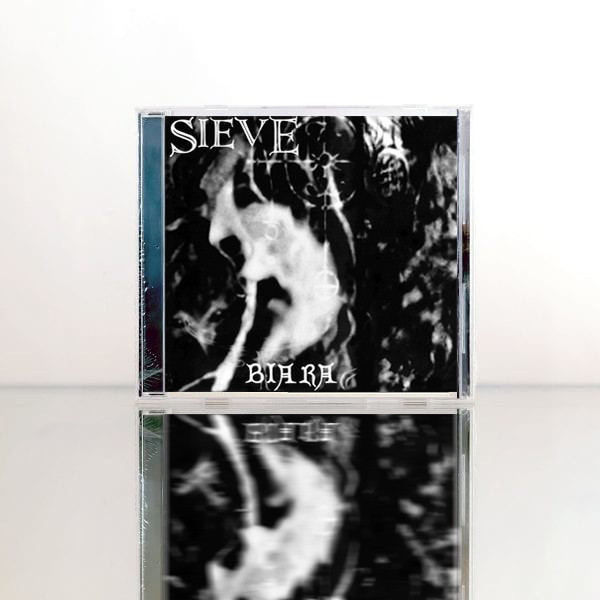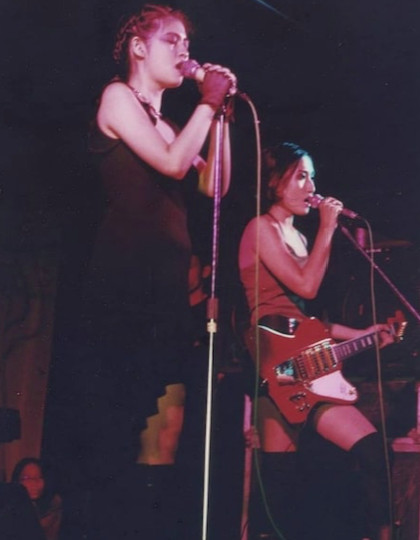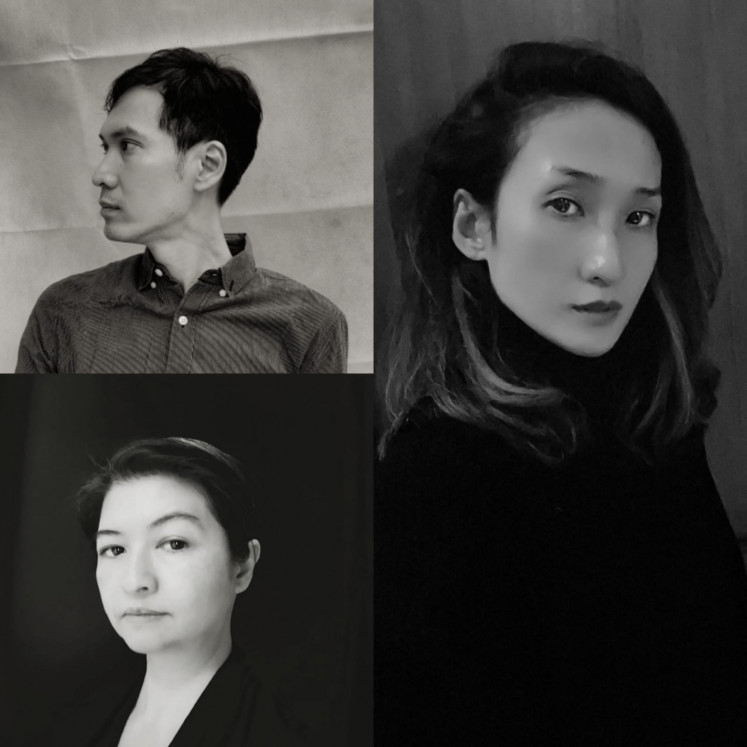Popular Reads
Top Results
Can't find what you're looking for?
View all search resultsPopular Reads
Top Results
Can't find what you're looking for?
View all search resultsSecond chance: Bandung darkwave band Sieve returns from 22-year hiatus
Change text size
Gift Premium Articles
to Anyone
The band’s short discography is being re-released by Anoa Records, giving the band a new motivation to write music again.
The story of a promising band about to make its mark only to implode early and vanish into obscurity is unfortunately a common one. After releasing an EP in the late 90s and gaining popularity among the underground music community, Bandung’s Sieve went inactive just a few years later while some of its contemporaries went on to become well-known acts. After 22 years, Jakarta’s label Anoa Records is releasing an eight-track CD of the band’s discography so far, marking the band’s official comeback.
During the band’s hiatus, Sieve’s original Biara EP (Monastery EP), which was released in small quantities on cassettes in 1999, became a highly sought-after item among music collectors. These days the tape can fetch as much as Rp 350,000 (US$24.44) — It was originally sold for Rp 15,000 ($1.05).
A pioneer of darkwave
A member of the industrial outfit SEL, Richard Riza started writing songs for his girlfriend at the time, Alexandra J. Wuisan, who had just left the legendary alternative-pop group Cherry Bombshell — before she got a chance to lay down her vocals on the band’s critically acclaimed debut album Waktu Hijau Dulu — and encouraged her to start a new musical project. Riza’s younger sister Regina Rina, who has been playing piano and guitar since she was young, was recruited and in late 1998, Sieve was born.
In the mid- to late 1990’s, thanks to the rising popularity of industrial, synth-heavy groups such as Nine Inch Nails and Ministry, Indonesian bands such as Koil, Sic Mynded and Riza’s own SEL were exploring this style. However, with Sieve, Riza wanted to create something different. And thanks to Alexandra’s ethereal vocals, the band produced a haunting, dark sound that was unique to the local scene at the time.
Arian Arifin, the lead singer of Jakarta’s heavy metal band Seringai, who at the time was the frontman of Bandung’s influential hardcore outfit Puppen, is among those who saw the band’s few early live performance first-hand and confirmed that they were among the first to play darkwave in the country.
“Even though Bandung had a lot of bands experimenting with different sounds in the late 90s and early 2000s, I hadn’t heard anything like Sieve at the time,” Arian said, “I knew people who listened to Sieve’s influences such as [influential British darkwave/dream pop acts] Cocteau Twins or This Mortal Coil, but Sieve was among the first who translated it into their own material.”
On stage, Sieve would consist of only Alexandra and Regina, with two additional musicians to round up the sound. Riza took care of the sound engineering off stage or in the back, a decision that was partly made because he did not want Sieve to be seen as a band featuring a romantic couple.
Teenage angst and cult
Looking at the lyrics to Sieve’s Biara EP, which is entirely written by vocalist Alexandra, it is not hard to see that there is a lot of rage and dissatisfaction conveyed in a somewhat metaphorical language touching upon the themes of religion and spirituality.
Vocalist Alexandra, who was 25 when she wrote it, admitted that she “was late in her emotional development” and the lyrics were her way of dealing with her emotions at the time.
“There was a lot of teenage angst and rage,” Alexandra recalled, “Unlike kids these days, I didn’t know anything about self care and managing my emotions.”
She admits that her writing at the time was influenced by paganism and witchcraft, a natural product of her being part of a “cult”-like circle within an organization that she is unwilling to name, for the sake of the safety of her and her family.
“The organization’s teaching was actually good, it’s a little like yoga, about well-being and those types of teachings,” Alexandra recalled, “but this small circle was using a rather extreme method involving ancient rituals and substances.”
After about a year, she quickly left the group.
“The stupid things we do when we are young,” Alexandra concluded.
The hiatus
In 2002, Sieve went on hiatus when Alexandra moved to Bali for work. All the other members returned to their busy personal lives.
Riza’s main band, SEL, also went inactive in the early 2000s. Since then, he has tried a few times to start new projects but they never materialized. Eventually, he and Leon Ray Legoh of the band Koil started a pop band called Kabut Pagi (Morning Mist).
“We both got bored with heavy music,” Riza said, “we’re not trying to sound old or anything, but we wanted to explore pop music.”
Alexandra was often invited to be a guest vocalist for popular independent bands such as Seringai and The Milo but it was not until 2020 that she finally started her own project with Full of Hate’s Ekyno called Gergasi Api (Fire Giant).
All three members have since married and started families of their own.
New music on the horizon
Older, more goth?: All in their 40s, Sieve is getting a second chance in their musical journey, two decades after they went on hiatus. (Courtesy of Anoa Records) (Personal collection/Courtesy of Anoa Records)Thanks to the persistent support of Anoa Records, the label managed to not only convince Sieve to release its discography, but also encourage the band to start writing music again.
Initially, all three members, who are now in their 40’s expressed their insecurity and doubts.
“We weren’t confident,” Riza said, “We had been inactive for too long, and many younger bands are better.”
But after a lot of convincing from the label’s side, as well as Anoa releasing music projects whose members are from Sieve’s circle — Silverglaze (featuring Ajie Gergaji of The Milo, Widi Ariani and Harry Ajo of Cherry Bombshell), The Milo’s B-Side, as well as Alexandra’s other project Gergasi Api, the label started to gain the band’s trust.
“Due to the constant support from Anoa, and Peter showing me all these new bands playing dark music like we did, we thought why not give it a try?” Riza said.
The band is aware that two decades have passed since they last wrote songs together, and they don’t intend to sound the same.
“We won’t try to fit it with the current trends or anything, but I love exploring and growing, so we for sure won’t write the same songs,” Riza added.
Guitarist Rina also wanted the band’s music to grab more people this time around.
“Back then, almost all our listeners were guys; I want the girls to enjoy our music as well, I want something for everyone,” Rina said, “But the dreamy aspect will probably stay, because that’s Sieve’s character.”
The band members are currently recording their individual parts at home but plan to hit the studio together next year once health protocols ease up.
Age is irrelevant
Twenty-five-year-old Anida Bajumi runs small boutique label Ordo Nocturno, which focuses mostly on current Indonesian post-punk releases. She was not around when Sieve was first active but enjoys their music anyway.
“What makes them unique is that while most current bands in this genre often focus on having low and dark vocals, Sieve was not about that,” Anida said, “They have their own thing.”
“And it’d be cool for the current generation to learn that there were bands playing this type of music way back in the 90s,” she continued.
Peter Andriaan Walandow, one of Anoa Records’ co-founders, said good songwriting triumphed all, regardless of what era a piece of music came from.
“Even though Sieve is pretty much a product of 90’s music, their songwriting is good and they were able to translate the essence of the style they’re playing,” Peter said, “And that makes Biara an important release.
“We hope that by releasing this album, it will ‘trigger’ some sort of reaction,” Peter continued, “It’s not about whether it’s old or young anymore, but that this music existed, and it’s worth listening to by fans of the music style.”












